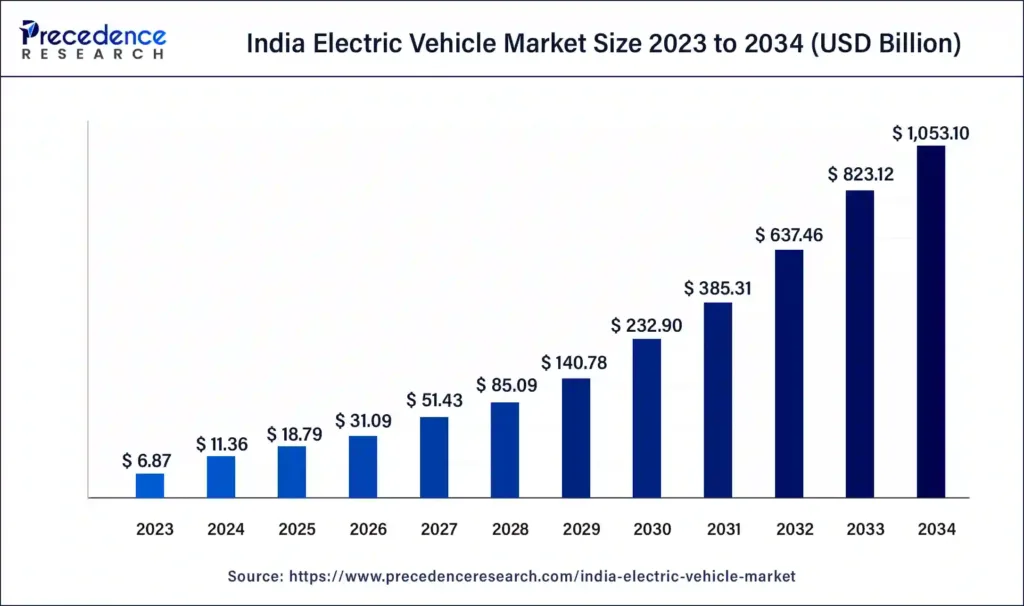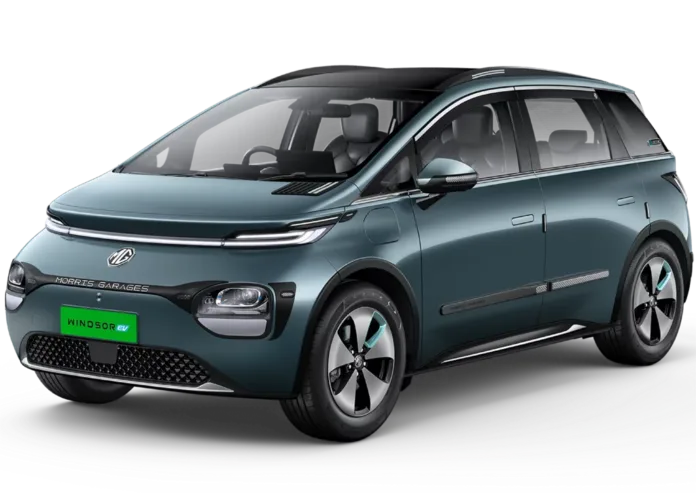The Indian EV market is on the brink of a revolutionary transformation, with projections indicating a massive growth trajectory by 2030. According to Nitin Gadkari, India’s Minister of Road Transport and Highways, the electric vehicle (EV) sector is expected to reach a staggering valuation of ₹20 lakh crore by the end of the decade. This growth is not just about numbers—it’s about creating a sustainable future, reducing pollution, and generating millions of jobs. Let’s dive into why the Indian EV market is the next big thing and how it’s set to reshape the country’s economy and environment.
The Indian EV Market: A Game-Changer for the Economy
The Indian EV market is more than just a shift in transportation; it’s a movement toward a greener, more sustainable future. By 2030, the sector is expected to create 5 crore jobs across the EV ecosystem, including manufacturing, services, and infrastructure development. This growth is fueled by increasing demand for electric vehicles in both domestic and international markets, as the world collectively moves toward green energy solutions.
Key Projections for the Indian EV Market
- Market Valuation: The Indian EV market is projected to hit ₹20 lakh crore by 2030, making it one of the largest EV markets globally.
- EV Financing Boom: The EV financing market is estimated to grow to ₹4 lakh crore, reflecting the increasing affordability and accessibility of electric vehicles.
- Job Creation: With 5 crore jobs expected to be generated, the EV sector will play a pivotal role in reducing unemployment and boosting India’s economy.

Why the Indian EV Market Is Crucial for Sustainability
Tackling Air Pollution
India’s transport sector is responsible for 40% of the country’s air pollution, making the shift to electric vehicles a critical step in combating environmental degradation. EVs offer a cleaner, greener alternative to traditional fossil fuel-powered vehicles, significantly reducing carbon emissions.
Reducing Fossil Fuel Dependency
India currently spends a whopping ₹22 lakh crore annually on fossil fuel imports. By expanding the EV market and focusing on renewable energy sources like solar, hydro, and biomass, the country can drastically cut its reliance on imported fuels, saving billions and enhancing energy security.
Opportunities in the Indian EV Market
The Indian EV market is not just about replacing petrol and diesel vehicles; it’s about creating a robust ecosystem that includes manufacturing, infrastructure, and exports. Here’s why this sector is a goldmine of opportunities:
- Global Export Potential: With advanced technology, futuristic research, and adherence to international quality standards, India has the potential to become a global hub for EV manufacturing and exports.
- Demand for Electric Buses: India currently needs 1 lakh electric buses, but the production capacity is limited to 50,000. This gap presents a massive opportunity for manufacturers to scale up and meet the demand.
- Green Energy Integration: With 44% of India’s power already coming from solar energy, the government is prioritizing the development of renewable energy sources to power the EV revolution.
Challenges Hindering the Indian EV Market
While the growth potential is immense, the Indian EV market faces several challenges that need to be addressed:
- Limited Production Capacity: The current production capacity for EVs, especially electric buses, is insufficient to meet the growing demand.
- High Initial Costs: Despite government subsidies, the upfront cost of EVs remains a barrier for many consumers.
- Infrastructure Gaps: The lack of widespread charging infrastructure is a significant hurdle in the adoption of EVs.
Government’s Role in Driving the Indian EV Market
The Indian government is playing a proactive role in promoting the EV sector. From offering subsidies to manufacturers to prioritizing renewable energy development, the government is laying the groundwork for a sustainable EV ecosystem. Key initiatives include:
- Focus on Green Energy: Nearly half of India’s power basket is already derived from solar energy, with plans to expand hydro and biomass energy production.
- Encouraging Local Manufacturing: Nitin Gadkari has urged manufacturers to scale up production capacities without compromising on quality, emphasizing the need to meet both domestic and export demands.

The Road Ahead for the Indian EV Market
The Indian EV market is not just a trend; it’s a necessity for a sustainable future. With the right mix of government support, private sector innovation, and consumer adoption, India is well-positioned to become a global leader in the EV space. Here’s what the future holds:
- Massive Job Creation: The sector is expected to generate 5 crore jobs, providing opportunities across manufacturing, services, and infrastructure.
- Economic Growth: The ₹20 lakh crore valuation by 2030 will significantly boost India’s GDP and reduce its trade deficit by cutting fossil fuel imports.
- Environmental Benefits: A shift to EVs will drastically reduce air pollution, making Indian cities cleaner and healthier.
Conclusion: Why the Indian EV Market Is the Future
The Indian EV market is more than just an industry—it’s a movement toward a cleaner, greener, and more self-reliant India. With a projected valuation of ₹20 lakh crore, the potential to create 5 crore jobs, and the ability to reduce fossil fuel dependency, the EV sector is set to transform India’s economy and environment.
As the world moves toward sustainable energy solutions, India has the opportunity to lead the charge. By investing in technology, scaling up production, and focusing on quality, the Indian EV market can capture global attention and become a powerhouse in the green energy revolution.
Also read- Nitin Gadkari Reviews Mahindra BE 6, XEV 9e: EVs That Stun!
What is the projected size of the Indian EV market by 2030?
The Indian EV market is expected to reach ₹20 lakh crore by 2030.
How many jobs will the Indian EV market create?
The sector is projected to generate 5 crore jobs across the EV ecosystem.
What are the key challenges for the Indian EV market?
Challenges include limited production capacity, high initial costs, and inadequate charging infrastructure.


